
VOCATIONAL SCHOOL
Department of Radio and Tv Programming (Turkish)
MTOI 220 | Course Introduction and Application Information
| Course Name |
Coaching, Leadership and Career Management
|
|
Code
|
Semester
|
Theory
(hour/week) |
Application/Lab
(hour/week) |
Local Credits
|
ECTS
|
|
MTOI 220
|
Fall/Spring
|
3
|
0
|
3
|
5
|
| Prerequisites |
None
|
|||||
| Course Language |
Turkish
|
|||||
| Course Type |
Service Course
|
|||||
| Course Level |
Short Cycle
|
|||||
| Mode of Delivery | - | |||||
| Teaching Methods and Techniques of the Course | Q&ALecture / Presentation | |||||
| Course Coordinator | - | |||||
| Course Lecturer(s) | ||||||
| Assistant(s) | - | |||||
| Course Objectives | The aim of the course is to teach the students the necessary coaching approaches in order to put coaching as a natural leadership style in their work and private life. In this context, students will learn basic coaching skills and leadership styles. They will be better acquainted with values, strengths and developmental areas, and will learn how they can demonstrate their coaching approach in their leadership styles. |
| Learning Outcomes |
The students who succeeded in this course;
|
| Course Description | Basic Coaching Information, Coaching and Leadership Competencies, Leadership Styles, Values and Its Importance in Coaching, Effective Expression and Communication Techniques, Recognition and Application of Coaching Tools will be covered in the lecture. |
|
|
Core Courses | |
| Major Area Courses | ||
| Supportive Courses | ||
| Media and Management Skills Courses | ||
| Transferable Skill Courses |
WEEKLY SUBJECTS AND RELATED PREPARATION STUDIES
| Week | Subjects | Related Preparation |
| 1 | What is coaching and what is not? Getting to know the coaching approach | |
| 2 | Basic Coaching Session and Coach's Competencies | Tanıştırayım; Koçluk. Salon Yayınları, 2021. ISBN: 9786257336079. Page: 1-31. |
| 3 | How does adaptation achieved in a coaching relationship? Recognizing Different Behavior Patterns and Different Learning Styles | Tanıştırayım; Koçluk. Salon Yayınları, 2021. ISBN: 9786257336079. Syf 31-65. |
| 4 | What is Coaching Based Communication? How can we ensure effective listening and asking questions? | |
| 5 | How to give feedback? What are the powerful coaching communication tools? | Tanıştırayım; Koçluk. Salon Yayınları, 2021. ISBN: 9786257336079. Page: 65-110 |
| 6 | What are the coaching stages? How an ideal target should be? | Lecture notes |
| 7 | How to Provide Motivation Related to the target? How to Make an Action Plan? | Tanıştırayım; Koçluk. Salon Yayınları, 2021. ISBN: 9786257336079. Page:110-131 |
| 8 | Midterm | |
| 9 | Meeting a new Coaching Tool with the Life Circle Technique | Lecture notes / coaching demo by the Head of Education |
| 10 | Leadership and coaching importance in leadership; Effective leadership competencies with coaching approach; Leadership Styles | Tanıştırayım; Koçluk. Salon Yayınları, 2021. ISBN: 9786257336079. Page 131-168. |
| 11 | Management with values and employee commitment, Management and coaching Approach: Coaching approach in career management, performance management and development planning | Tanıştırayım; Koçluk. Salon Yayınları, 2021. ISBN: 9786257336079. Page 168-200 |
| 12 | New coaching tool; Value Chain Execution | Lecture notes |
| 13 | Project presentations | |
| 14 | Practice: Students having coaching meetings with each other | |
| 15 | Review | |
| 16 | Review |
| Course Notes/Textbooks | Tanıştırayım; Koçluk. Salon Yayınları, 2021. ISBN: 9786257336079. |
| Suggested Readings/Materials |
|
EVALUATION SYSTEM
| Semester Activities | Number | Weigthing |
| Participation |
1
|
15
|
| Laboratory / Application | ||
| Field Work | ||
| Quizzes / Studio Critiques | ||
| Portfolio | ||
| Homework / Assignments |
1
|
25
|
| Presentation / Jury | ||
| Project | ||
| Seminar / Workshop | ||
| Oral Exams | ||
| Midterm |
2
|
60
|
| Final Exam | ||
| Total |
| Weighting of Semester Activities on the Final Grade |
4
|
100
|
| Weighting of End-of-Semester Activities on the Final Grade | ||
| Total |
ECTS / WORKLOAD TABLE
| Semester Activities | Number | Duration (Hours) | Workload |
|---|---|---|---|
| Theoretical Course Hours (Including exam week: 16 x total hours) |
16
|
3
|
48
|
| Laboratory / Application Hours (Including exam week: '.16.' x total hours) |
16
|
0
|
|
| Study Hours Out of Class |
16
|
3
|
48
|
| Field Work |
0
|
||
| Quizzes / Studio Critiques |
0
|
||
| Portfolio |
0
|
||
| Homework / Assignments |
1
|
10
|
10
|
| Presentation / Jury |
0
|
||
| Project |
0
|
||
| Seminar / Workshop |
0
|
||
| Oral Exam |
0
|
||
| Midterms |
2
|
22
|
44
|
| Final Exam |
0
|
||
| Total |
150
|
COURSE LEARNING OUTCOMES AND PROGRAM QUALIFICATIONS RELATIONSHIP
|
#
|
Program Competencies/Outcomes |
* Contribution Level
|
||||
|
1
|
2
|
3
|
4
|
5
|
||
| 1 | To be able to define the historical development process, fundamental principles, and theories of Radio and Television Programming, and explain the basic principles of audio-visual storytelling. |
|||||
| 2 | To be able to utilize technical equipment and software requiring expertise in the field of Radio and Television Programming according to contemporary techniques. |
|||||
| 3 | To be able to describe the pre-production research of an audio-visual work, scriptwriting, production planning, camera usage, sound recording, lighting setup, and post-production editing design at a fundamental level and apply at least one of them at an advanced level. |
X | ||||
| 4 | To be able to apply standard video shooting and sound recording indoors and outdoors within the scope of a production in teamwork. |
X | ||||
| 5 | To be able to explain the national and universal values, professional and ethical principles, and legal regulations required in radio-television broadcasting. |
X | ||||
| 6 | To be able to evaluate audio-visual outputs based on technical and methodological criticism. |
X | ||||
| 7 | To be able to generate creative and critical approaches and projects suitable for the broadcasting platform and selected media, taking responsibility in individual or teamwork. |
X | ||||
| 8 | To be able to consider occupational safety principles while working in media, production, and press-broadcasting fields. |
X | ||||
| 9 | To be able to apply the knowledge gained in classes within the scope of an internship in relevant job fields. |
X | ||||
| 10 | To be able to follow the information in the field and communicate with colleagues by using English at the general level of European Language Portfolio A2. |
X | ||||
| 11 | To be able to possess interdisciplinary knowledge in artistic, cultural, and social issues related to communication fields and programs. |
|||||
| 12 | To be able to direct their learning towards an advanced educational level by keeping track of technological changes and innovations, considering a lifelong learning vision. |
|||||
| 13 | To be able to analyze the universal and social dimensions and legal consequences of their professional work in the field concerning human rights, cultural diversity, environmental issues, public interest, and public service. |
|||||
*1 Lowest, 2 Low, 3 Average, 4 High, 5 Highest
NEWS |ALL NEWS
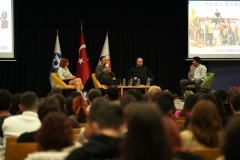
‘Mortal World 2’ actors at IUE
Sarp Apak and Ahmet Mümtaz Taylan, the actors of the film ‘Ölümlü Dünya 2’ (Mortal World 2), which has garnered significant attention
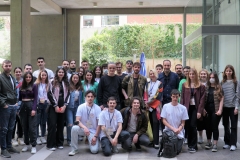
500 students met at the 'festival'
Izmir University of Economics (IUE) Vocational School held one of the biggest design and creativity festivals in the city. 500 students participating
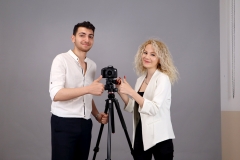
PA’s to the world-famous program from IUE
Hilal Yapıcıoğlu and Doğukan Sözen, students of Izmir University of Economics (IUE) Radio and Television Programming, worked as 'production assistants' in the
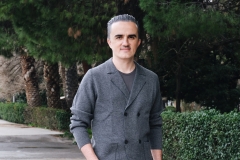
Turkish photography will be promoted in Italy
IUE Lecturer Emre Küheylan was invited as a curator and speaker to the world-famous photography festival called 'Photolux' to be held in

'Turkish coffee' and 'fortune telling' became a documentary
'Turkish coffee', which has become one of the indispensable values of our culture, inherited from centuries ago, and 'coffee fortune-telling', which many
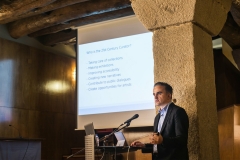
The first Turkish person in the giant jury
Emre Küheylan, Lecturer at Izmir University of Economics (IUE), who has works that made a difference in photography, whose works are exhibited
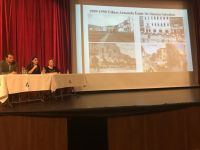
IZMIR CINEMAS WILL REVIVE
Film industry has been addressed at the “Revive Cinema in Izmir Again!” themed panel that took place on Thursday, December 20 at

